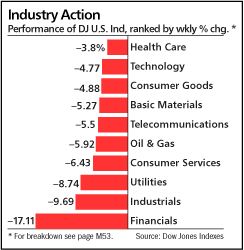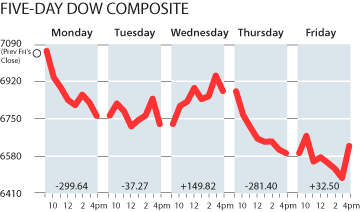This is another great time to buy a great company at discounted price. (Tim)
By ANDREW BARY
GENERAL ELECTRIC'S FIRST-QUARTER PROFIT SHORTFALL FRIDAY shocked Wall Street, embarrassed the company and hurt the credibility of CEO Jeff Immelt. But it doesn't kill the investment case for the company, whose shares now trade about where they stood a decade ago.
GE shares (ticker: GE) tumbled 4.70 points Friday to 32.05 -- a 13% decline and the worst one-day percentage drop in the stock since the 1987 market crash. The plunge is understandable, since GE's profits rarely fall short of the Street's expectations and the first-quarter profit miss was significant. GE earned 44 cents from operations in the period, down 8% from 48 cents in the year-earlier period, and seven cents below the consensus estimate of 51 cents.
GE now expects to earn $2.20 to $2.30 a share in 2008, below the prior consensus of $2.43. The new guidance from GE calls for zero to 5% growth in profits relative to the $2.20 that the company earned last year, which was up 18% from 2006.
A chastened Immelt said he was "disappointed" with the results, which largely reflect a shortfall at GE's huge financial-services unit, General Electric Capital Services. The earnings-miss came less than a month after Immelt reaffirmed GE's '08 guidance of at least 10% earnings growth, and six weeks after he personally spent $5 million to buy GE shares in the open market at about 33 a share.
The GE news, released before trading opened Friday, rocked the stock market as investors worried about the global impact of a slowing U.S. economy and touchy conditions in the credit markets. Investors wondered: "If GE got stung, how will lesser companies fare?"
The Dow Jones industrials fell 257, to 12,325 Friday, while the Standard & Poor's 500 index declined 28 points, to 1333. About 20% of the S&P 500 drop was driven by GE's loss, which sliced $47 billion from its market value, now $320 billion.
GE now trades for a reasonable 14.2 times estimated 2008 profits of $2.25 a share, using the midpoint of the current guidance. It's just 13 times estimated 2009 profits of $2.50 a share. Our 2009 estimate assumes 10% to 11% earnings growth next year, off a base of $2.25. GE has a secure, bond-like dividend yield of 3.9%.
General Electric is one of the best plays on the global-infrastructure boom, due to its strength in gas and wind turbines, jet engines and locomotives. Its infrastructure division, which includes these businesses, generated 23% revenue growth and 17% profit growth in the first quarter -- the brightest spot for the company. This division, which accounts for 40% of GE's earnings, experienced 11% order growth in the period.
BEFORE FRIDAY'S SURPRISE, bullish Street analysts looked for GE shares to trade into the low- to mid-40s in the next year. That might not happen, given the reduced profit outlook. A move to 40 doesn't seem impossible, however, if GE can meet its reduced profit guidance for 2008 and stays on track to earn $2.50 a share in 2009. If GE rises to 40, investors would get a total return, including dividends, of almost 30%.
GE's risk/reward ratio looks pretty good. Even if profit guidance for 2008 falls further -- to say, $2 a share -- downside in the stock probably isn't much lower than 28. That said, Barron's has been overly optimistic on GE, most recently in a cover story when the stock stood at 37 ("GE's Moment," June 4, 2007).
Some Street analysts are souring on GE, including Citigroup's Jeff Sprague, who cut his rating to Hold from Buy on Friday and reduced his price target to 36 from 45. In a report titled "If GE Can't Outshine Now, When?" Sprague wrote that "evidence is mounting that GE is too big and complex to manage effectively. At a minimum, we appear stuck in a framework where something always is underperforming, detracting from the positives in the portfolio."
The big frustration on Wall Street is that GE's powerhouse infrastructure business is being offset by its financial-services arm. GE Capital contributes about 40% of GE's profits. Setbacks in GE Capital's real-estate, commercial and consumer-finance businesses were the main reasons for the first-quarter profit miss. Much of the weakness surfaced at the end of March, surprising Immelt and GE brass.
Pressure is apt to build on GE to shed certain businesses, including real estate and consumer finance, as well as NBC Universal. NBCU, which includes NBC and the Bravo cable network, had disappointing profit growth of 3% in the first quarter. NBCU has no clear connection with the rest of GE, but the benefits of a sale are dubious, if only because entertainment companies are out of favor on Wall Street. Given the low valuations of Time Warner (TWX), Disney (DIS) and CBS (CBS), GE might not get the $40 billion price that has been put on NBCU.
The Bottom Line
If GE can meet its reduced profit guidance for '08 and stay on track in '09, its shares could rebound to 40, for a total return of almost 30%.
The bear case for GE is that GE Capital will continue to suffer from weakening credit conditions, and the growth in GE's infrastructure businesses will slow. GE's price/earnings ratio is about the same as that of United Technologies (UTX). Bears argue GE is fully priced, given its reliance on financial businesses that get accorded low P/E ratios in the stock market.
In Immelt's annual letter to shareholders, he suggested that GE might be a "perfect investment" for today's challenging business and financial environment. Friday's news rendered that an overstatement, but GE remains one of the great global businesses and a company, in Immelt's words, that is "built to perform in good times and bad." One disappointing quarter shouldn't change all that.
Subscribe to:
Post Comments (Atom)



No comments:
Post a Comment